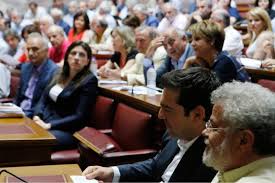Greek lawmakers pass austerity bill
Thu 16 Jul 2015, 12:27:28

Athens: Greek lawmakers voted overwhelmingly early today to approve a harsh austerity bill demanded by bailout creditors, despite significant dissent from members of Prime Minister Alexis Tsipras' own left-wing party.
The bill, which imposes sweeping tax hikes and spending cuts, fuelled anger in the governing Syriza party and led to a revolt against Tsipras, who has insisted the deal forged after a marathon weekend eurozone summit was the best he could do to prevent Greece from catastrophically crashing out of the euro, Europe's joint currency.
The legislation was approved with 229 votes in favour, 64 against and six abstentions and won the support of three pro-European opposition parties.
Among Syriza's 38 dissenters were prominent party members, including Energy Minister Panagiotis Lafazanis and former finance minister Yanis Varoufakis, who many blame for exacerbating tensions with Greece's creditors with his abrasive style during five months of tortured negotiations.
The post-midnight vote might not pose an immediate threat to Tsipras' government, but it raised more doubts over whether it could implement the harsh new austerity program demanded by rescue lenders.
The vote came after an anti-austerity demonstration by about 12,000
protesters outside parliament degenerated into violence as the debate was getting underway last night. Riot police battled youths who hurled petrol bombs for about an hour before the clashes died down.
protesters outside parliament degenerated into violence as the debate was getting underway last night. Riot police battled youths who hurled petrol bombs for about an hour before the clashes died down.
The bill was the first step Greece must take in order to begin negotiations with creditors on a new bailout, its third in five years, of about 85 billion euros (USD 93 billion) in loans over three years.
Dissenters argued that Greeks could not face any further cuts after six years of recession that saw poverty and unemployment skyrocket and wiped out a quarter of the country's economy.
Tsipras has been battling all week to persuade party hard-liners to back the deal. He has acknowledged the agreement reached with creditors was far from what he wanted and trampled on his pre-election promises of repealing austerity, but insisted the alternative would have been far worse for the country.
"We had a very specific choice: A deal we largely disagreed with, or a chaotic default," he told parliament ahead of the vote.
Tsipras had urged Syriza members to back the bill despite having urged voters to reject earlier, milder creditor demands in a July 5 referendum. Greeks voted overwhelmingly to reject those proposals.
No Comments For This Post, Be first to write a Comment.
Most viewed from Specials
Most viewed from World
AIMIM News
Delhi Assembly polls: Owaisi leads Padyatra in Okhla
Feb 01, 2025
We reject this Waqf Amendment Bill: Asaduddin Owaisi
Jan 30, 2025
Latest Urdu News
Most Viewed
May 26, 2020
Which political party will win the Delhi Assembly polls to be held on Feb 5?
Latest Videos View All
Like Us
Home
About Us
Advertise With Us
All Polls
Epaper Archives
Privacy Policy
Contact Us
Download Etemaad App
© 2025 Etemaad Daily News, All Rights Reserved.













.jpg)
.jpg)
.jpg)
.jpg)
.jpg)
.jpg)
.jpg)
.jpg)
.jpg)
.jpg)
.jpg)
.jpg)

















